Energy economics - Project examples
-
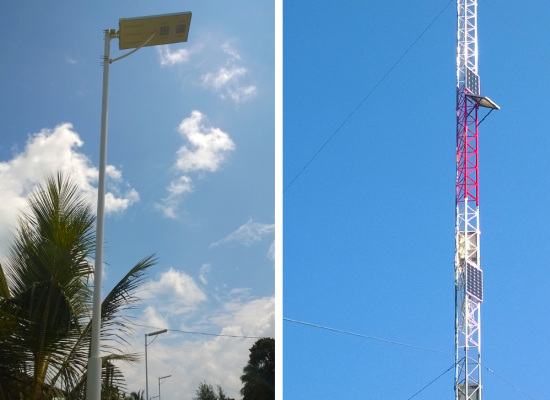
Tanzania - Zanzibar Renewable Energies and Energy Efficiency Programme
The EU has formulated a comprehensive programme to support the RE and EE Initiative in Zanzibar. This includes the supply and installation of wind and solar measurement equipment (separately contracted) and the recruitment of consultancy services for the implementation of the programme in 2 lots: the present study work (Lot 1) and technical assistance for the implementation of RE and EE projects to be separately contracted as Lot 2.
intec's services
- Collection and analysis of wind and solar resource data for a period of 12 months resulting in a wind map for the archipelago, in the confirmation of 5 wind sites and of 3 solar farm sites for feasibility analyses
- Grid impact study: load flow, static and dynamic analysis, maximum penetration estimation, capacity factor calculation, estimation of needed rotational reserve and report preparation.
- Logistics study for wind parks and solar farms (harbour/landing facilities, transport and construction equipment, access roads, etc.; development of a logistics plan)
- Wind flow modelling for selected sites and solar PV potential, inter alia development of a digital terrain model (DTM) for the pre-selected sites
- Output prediction for wind parks and solar PV farms incl. selection of wind turbines and PV panels to consider, loss and risk analyses
- Feasibility studies for wind parks, solar farms and solar home systems (SHS), incl. preliminary project designs and cost estimates, grid integration studies (33 kV), SCADA, civil engineering, financial and economic analyses, preliminary standardized design of SHS, and procurement and construction schedule
- Evaluation of regulatory requirements (permits and licenses, land use, laws on construction and operation of wind parks and solar farms)
- Environmental and social impact assessments (EIA and SIA), including development of an environmental monitoring and management plan (EMMP)
Client
The Alternate National Authorizing Officer (NAO), Ministry of FinanceFinancing
European CommissionPeriod of implementation
1.8.2015 - 01.09.2018 -
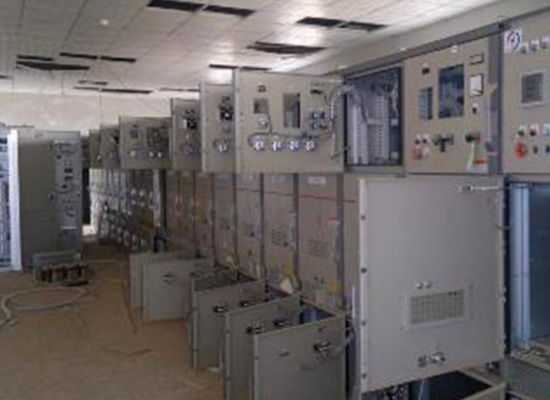
Iraq - Technical Support for the German "Credit Facility to Assist the Return of IDPs" in Iraq
Germany’s government, via the KfW, provides a credit facility (United Financial Loan or UFL) for stabilization/recovery of liberated territories, and to assist the return of Internally Displaced Persons (IDPs). Part of the project is the assistance to the Ministry of Electricity (MoE) in the preparation of an investment programme (‘investment measure’) and a related technical support component (‘accompanying measure’), to assess and plan measures for the rehabilitation of the transmission/distribution networks for re-establishing power feeders to the end users. This results in an ‘Investment Plan for the Power Sector in Northern Iraq’, consisting of Phase I for immediate implementation, then Phase II for complementary required investments.
Measures identified for Phase I include the rehabilitation of one 132/33 kV, 3 x 63 MVA GIS substations and three 132/33/11 kV AIS substations, supply of three 132/33/11 kV, 3 x 63 MVA power transformers, supply of 132 kV transmission line towers and accessories for rehabilitation of six transmission lines, supply of eight 33/11 kV, 31.5 MVA mobile substations, five 33/11 kV, 31.5 MVA power transformers and supply of distribution transformers 11/0.4 kV, different power ratings, as well as distribution kiosks and accessories.
Measures identified for Phase II include the rehabilitation of a 400/132/11 kV, 4 x 250 MV GIS substation, the construction of two new 132/33 kV, 3 x 63 MVA GIS substations, the construction of two new 33/11 kV, 3 x 31.5 MVA distribution substations and the construction of 154 km new double circuit transmission line
intec's services
- Analysis of relevant data collected from MoE, KfW and other institutions, i. a. a list of priority projects
- Mission to Baghdad for interviews and collection of additional information
- Evaluation of the current energy supply and definition of the baseline scenario in the target regions
- Analysis of different investment measures (distribution/transmission), based on predefined criteria and proposing suitable investments
- Selection of appropriate investment schedules and procurement packages
- Preparation of an implementation plan and presenting results in a workshop with key stakeholders
- Preparation of tender documents
- Support to the Ministry of Electricity during tendering, tender evaluation and finalisation of contracts.)
- Preparation of ESMP document
Client
KfW EntwicklungsbankFinancing
KfW EntwicklungsbankPeriod of implementation
5.7.2017 - 31.8.2018 -
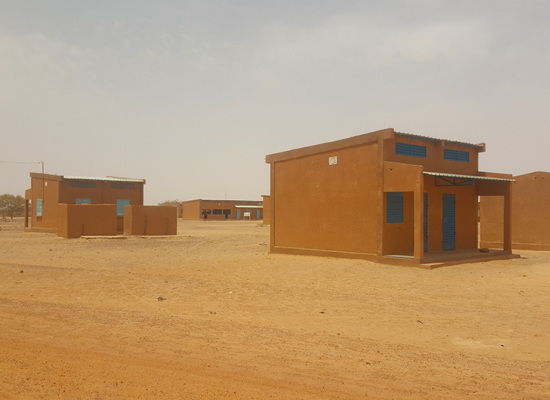
Niger - PV Hybridization of Diesel-Based Mini-Grids in Niger
The Government of Niger has been striving to increase electricity access and has set an ambitious goal of increasing the access rate to 60% by 2027. The objective of this assignment is to conduct the feasibility study of the hybridization with PV and expansion of access to electricity of several existing diesel-based isolated grids throughout Niger and managed by NIGELEC.
intec's services
- Georeferencing and analysis (GIS) of mini grids managed by NIGELEC
- Analysis of hybridization options and potential for grid expansion and access increase of access to electricity
- Elaboration of pre-feasibility study of the selected isolated grids
- Mid-term workshop to select final set for feasibility studies
- Site visit to each of the selected isolated grids at the feasibility stage, including demand assessment
- Elaboration of feasibility study of the selected isolated grids
- Training with national stakeholders
Client
World BankFinancing
World BankPeriod of implementation
02.11.2016 - 30.06.2018
Tanzania - Zanzibar Renewable Energies and Energy Efficiency Programme
The EU has formulated a comprehensive programme to support the RE and EE Initiative in Zanzibar. This includes the supply and installation of wind and solar measurement equipment (separately contracted) and the recruitment of consultancy services for the implementation of the programme in 2 lots: the present study work (Lot 1) and technical assistance for the implementation of RE and EE projects to be separately contracted as Lot 2.
intec's services
- Collection and analysis of wind and solar resource data for a period of 12 months resulting in a wind map for the archipelago, in the confirmation of 5 wind sites and of 3 solar farm sites for feasibility analyses
- Grid impact study: load flow, static and dynamic analysis, maximum penetration estimation, capacity factor calculation, estimation of needed rotational reserve and report preparation.
- Logistics study for wind parks and solar farms (harbour/landing facilities, transport and construction equipment, access roads, etc.; development of a logistics plan)
- Wind flow modelling for selected sites and solar PV potential, inter alia development of a digital terrain model (DTM) for the pre-selected sites
- Output prediction for wind parks and solar PV farms incl. selection of wind turbines and PV panels to consider, loss and risk analyses
- Feasibility studies for wind parks, solar farms and solar home systems (SHS), incl. preliminary project designs and cost estimates, grid integration studies (33 kV), SCADA, civil engineering, financial and economic analyses, preliminary standardized design of SHS, and procurement and construction schedule
- Evaluation of regulatory requirements (permits and licenses, land use, laws on construction and operation of wind parks and solar farms)
- Environmental and social impact assessments (EIA and SIA), including development of an environmental monitoring and management plan (EMMP)
Client
The Alternate National Authorizing Officer (NAO), Ministry of FinanceFinancing
European CommissionPeriod of implementation
1.8.2015 - 01.09.2018Iraq - Technical Support for the German "Credit Facility to Assist the Return of IDPs" in Iraq
Germany’s government, via the KfW, provides a credit facility (United Financial Loan or UFL) for stabilization/recovery of liberated territories, and to assist the return of Internally Displaced Persons (IDPs). Part of the project is the assistance to the Ministry of Electricity (MoE) in the preparation of an investment programme (‘investment measure’) and a related technical support component (‘accompanying measure’), to assess and plan measures for the rehabilitation of the transmission/distribution networks for re-establishing power feeders to the end users. This results in an ‘Investment Plan for the Power Sector in Northern Iraq’, consisting of Phase I for immediate implementation, then Phase II for complementary required investments.
Measures identified for Phase I include the rehabilitation of one 132/33 kV, 3 x 63 MVA GIS substations and three 132/33/11 kV AIS substations, supply of three 132/33/11 kV, 3 x 63 MVA power transformers, supply of 132 kV transmission line towers and accessories for rehabilitation of six transmission lines, supply of eight 33/11 kV, 31.5 MVA mobile substations, five 33/11 kV, 31.5 MVA power transformers and supply of distribution transformers 11/0.4 kV, different power ratings, as well as distribution kiosks and accessories.
Measures identified for Phase II include the rehabilitation of a 400/132/11 kV, 4 x 250 MV GIS substation, the construction of two new 132/33 kV, 3 x 63 MVA GIS substations, the construction of two new 33/11 kV, 3 x 31.5 MVA distribution substations and the construction of 154 km new double circuit transmission line
intec's services
- Analysis of relevant data collected from MoE, KfW and other institutions, i. a. a list of priority projects
- Mission to Baghdad for interviews and collection of additional information
- Evaluation of the current energy supply and definition of the baseline scenario in the target regions
- Analysis of different investment measures (distribution/transmission), based on predefined criteria and proposing suitable investments
- Selection of appropriate investment schedules and procurement packages
- Preparation of an implementation plan and presenting results in a workshop with key stakeholders
- Preparation of tender documents
- Support to the Ministry of Electricity during tendering, tender evaluation and finalisation of contracts.)
- Preparation of ESMP document
Client
KfW EntwicklungsbankFinancing
KfW EntwicklungsbankPeriod of implementation
5.7.2017 - 31.8.2018Niger - PV Hybridization of Diesel-Based Mini-Grids in Niger
The Government of Niger has been striving to increase electricity access and has set an ambitious goal of increasing the access rate to 60% by 2027. The objective of this assignment is to conduct the feasibility study of the hybridization with PV and expansion of access to electricity of several existing diesel-based isolated grids throughout Niger and managed by NIGELEC.
intec's services
- Georeferencing and analysis (GIS) of mini grids managed by NIGELEC
- Analysis of hybridization options and potential for grid expansion and access increase of access to electricity
- Elaboration of pre-feasibility study of the selected isolated grids
- Mid-term workshop to select final set for feasibility studies
- Site visit to each of the selected isolated grids at the feasibility stage, including demand assessment
- Elaboration of feasibility study of the selected isolated grids
- Training with national stakeholders
Client
World BankFinancing
World BankPeriod of implementation
02.11.2016 - 30.06.2018-
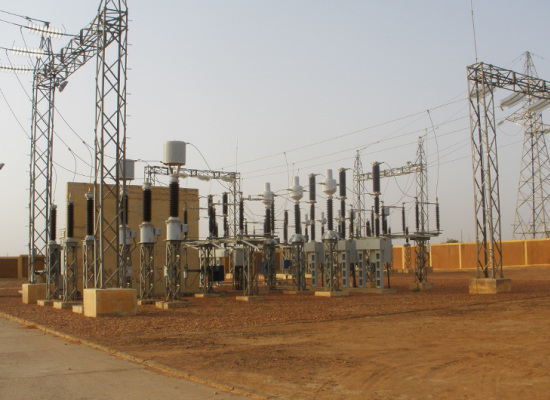
Mauritania - Solar Energy-Based Rural Electrification in the Aftout Elchargui Region
The Mauritanian Government initiated a national strategy to provide universal access to basic services (water, energy, telecommunication) in rural and suburban areas. In this context, the Government received a loan from the Islamic Development Bank and the OPEC Fund for International Development (OFID) for the implementation of strategic investments in electricity infrastructure, one of the components being consultancy services for project supervision. The project includes mainly:
- the procurement and installation of (i) one solar PV plant with an estimated capacity of 2.6 MWc and storage, (ii) a diesel back-up system to complement the electricity production (2 diesel gensets), and the optimisation of the envisaged electricity production as per the prevailing conditions
- the construction of approx. 270 km of HV transmission networks and approx. 60 km of LV distribution networks as well as approx. 6,000 consumer connections
intec's services
Mission 1: Detailed technical studies, including environmental and social impact studies for the equipment which is divided into 3 lots (power plants and their optimisation, HV networks, LV networks): Elaboration of preliminary design and detailed design for the chosen options, including technical specifications and dimensioning, engineering, functional specifications for the equipment, soil investigations, topography, BoQ etc., and elaboration of tender documents.
Mission 2: Support to the Employer during tendering: Site visits with the Bidders, reply to Bidders' queries, bid evaluation and support to the Employer during contract negotiations for the EPC contracts.
Mission 3: Technical control and supervision of works: Management of the implementation works, scheduling and steering of site works, and assistance during acceptance operations.
Client
Agence de Promotion de l'Accès Universel aux Services (APAUS)Financing
Islamic Development Bank (IDB)Period of implementation
2016 - 2018 -
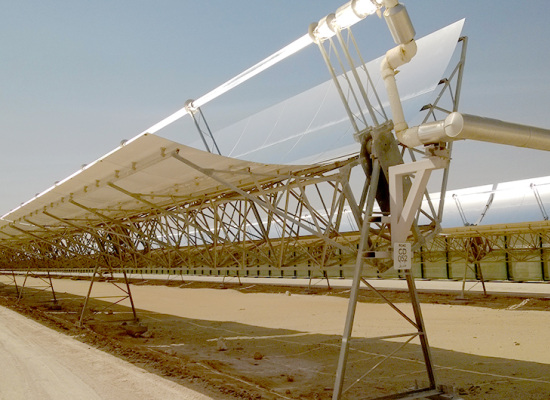
Libya - Strategic Plan for Renewable Energy Development
The situation of the electricity sector in Libya needs proper and rapid improvement, and the energy generation is mainly based on conventional energies burning heavy or light oil or gas fuel with a total installed generation capacity of around 9,000 MW mainly located in the shores north of the country. The use of renewable energies would allow Libya to cope with the increasing demand resulting from reconstruction of infrastructure destroyed during the last years and use oil & gas products to earn revenues for the country. The objective of this assignment is to develop a strategic plan for renewable energy development in the country.
intec's services
Stage I: Energy mix and renewable resource assessment
- development of a least cost expansion plan and renewable energy scenarios
Stage II: Strategic plan for development of renewable energy:
- analysis of institutional mechanism, procedures and processes for selection and licensing of RE projects
- develop a road map for RE and grid development until 2030 and estimate the size of investments required. The grid development roadmap includes the requirements for balancing reserve and proposes necessary power systems control infrastructure.
- summary of opportunities and interfaces of different set-ups
Stage III: Framework for a pilot private sector participation transaction
- develop technical specifications for Private Sector Participation (PSP) in wind and solar energy
- developing a grid code document for connecting renewable energy projects
- identify candidates for renewable energy PSP transactions
- analysis of the financial viability of the suggested pilot transactions
- conduct a risk assessment for PSP
- market analysis to identify interest in potential pilot projects
Stage IV: Specialized training and experience sharing workshops
Client
World BankFinancing
World BankPeriod of implementation
01/2017-12/2017; 05-06/2018 -
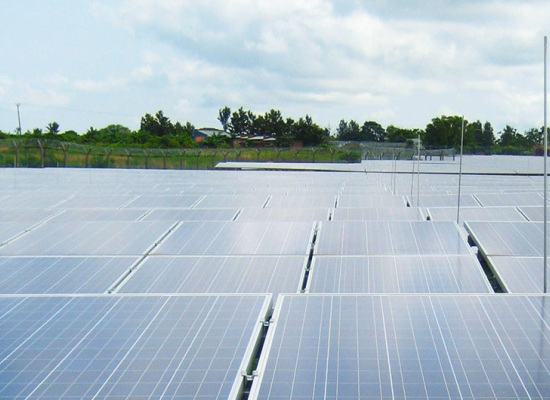
Uganda - 10 MW PV Solar Project in Soroti District
The Netherlands Development Finance Company (FMO) invests into a 10 MW PV solar power project to be developed, owned and operated by the company Access Uganda Solar Limited. FMO contracted the services of a consultant to carry out lenders' technical, environmental and social due diligence of the project, construction supervision and monitoring of operational performance.
intec's services
Due Diligence Phase
- Project site assessment: topography, solar resource and ambient conditions; logistics; etc.
- Review of technology and plant design
- Review of energy yield analysis and forecasts for expected power production in kWh
- Review of project contracts / agreements (i.a. PPA, interconnection, O&M, water supply & land agreements)
- Review of construction and completion testing, of off-take structure (PPA) and of O&M structure
- Electrical interconnection review
- Check and follow-up of permits and licenses
- Review of expected project costs and of financial model assumptions
- Review of the project's environmental and social impact assessment (ESIA) process and report
- Summary of recommendations and proposed actions in a draft environmental and social action plan (ESAP)
Construction and Commissioning Phase
- Construction monitoring and quality assurance
- Design review and approval
- Review of acceptance testing procedures and test witnessing
- Participation in commissioning and taking-over
Operational Phase (services on call until 2032)
- Monitoring of punch list items, review of operational performance, periodical review of operation reports
Client
Netherlands Development Finance Company ("FMO")Financing
Access Uganda Solar LimitedPeriod of implementation
20/03/2015 – 31/03/2018
Mauritania - Solar Energy-Based Rural Electrification in the Aftout Elchargui Region
The Mauritanian Government initiated a national strategy to provide universal access to basic services (water, energy, telecommunication) in rural and suburban areas. In this context, the Government received a loan from the Islamic Development Bank and the OPEC Fund for International Development (OFID) for the implementation of strategic investments in electricity infrastructure, one of the components being consultancy services for project supervision. The project includes mainly:
- the procurement and installation of (i) one solar PV plant with an estimated capacity of 2.6 MWc and storage, (ii) a diesel back-up system to complement the electricity production (2 diesel gensets), and the optimisation of the envisaged electricity production as per the prevailing conditions
- the construction of approx. 270 km of HV transmission networks and approx. 60 km of LV distribution networks as well as approx. 6,000 consumer connections
intec's services
Mission 1: Detailed technical studies, including environmental and social impact studies for the equipment which is divided into 3 lots (power plants and their optimisation, HV networks, LV networks): Elaboration of preliminary design and detailed design for the chosen options, including technical specifications and dimensioning, engineering, functional specifications for the equipment, soil investigations, topography, BoQ etc., and elaboration of tender documents.
Mission 2: Support to the Employer during tendering: Site visits with the Bidders, reply to Bidders' queries, bid evaluation and support to the Employer during contract negotiations for the EPC contracts.
Mission 3: Technical control and supervision of works: Management of the implementation works, scheduling and steering of site works, and assistance during acceptance operations.
Client
Agence de Promotion de l'Accès Universel aux Services (APAUS)Financing
Islamic Development Bank (IDB)Period of implementation
2016 - 2018Libya - Strategic Plan for Renewable Energy Development
The situation of the electricity sector in Libya needs proper and rapid improvement, and the energy generation is mainly based on conventional energies burning heavy or light oil or gas fuel with a total installed generation capacity of around 9,000 MW mainly located in the shores north of the country. The use of renewable energies would allow Libya to cope with the increasing demand resulting from reconstruction of infrastructure destroyed during the last years and use oil & gas products to earn revenues for the country. The objective of this assignment is to develop a strategic plan for renewable energy development in the country.
intec's services
Stage I: Energy mix and renewable resource assessment
- development of a least cost expansion plan and renewable energy scenarios
Stage II: Strategic plan for development of renewable energy:
- analysis of institutional mechanism, procedures and processes for selection and licensing of RE projects
- develop a road map for RE and grid development until 2030 and estimate the size of investments required. The grid development roadmap includes the requirements for balancing reserve and proposes necessary power systems control infrastructure.
- summary of opportunities and interfaces of different set-ups
Stage III: Framework for a pilot private sector participation transaction
- develop technical specifications for Private Sector Participation (PSP) in wind and solar energy
- developing a grid code document for connecting renewable energy projects
- identify candidates for renewable energy PSP transactions
- analysis of the financial viability of the suggested pilot transactions
- conduct a risk assessment for PSP
- market analysis to identify interest in potential pilot projects
Stage IV: Specialized training and experience sharing workshops
Client
World BankFinancing
World BankPeriod of implementation
01/2017-12/2017; 05-06/2018Uganda - 10 MW PV Solar Project in Soroti District
The Netherlands Development Finance Company (FMO) invests into a 10 MW PV solar power project to be developed, owned and operated by the company Access Uganda Solar Limited. FMO contracted the services of a consultant to carry out lenders' technical, environmental and social due diligence of the project, construction supervision and monitoring of operational performance.
intec's services
Due Diligence Phase
- Project site assessment: topography, solar resource and ambient conditions; logistics; etc.
- Review of technology and plant design
- Review of energy yield analysis and forecasts for expected power production in kWh
- Review of project contracts / agreements (i.a. PPA, interconnection, O&M, water supply & land agreements)
- Review of construction and completion testing, of off-take structure (PPA) and of O&M structure
- Electrical interconnection review
- Check and follow-up of permits and licenses
- Review of expected project costs and of financial model assumptions
- Review of the project's environmental and social impact assessment (ESIA) process and report
- Summary of recommendations and proposed actions in a draft environmental and social action plan (ESAP)
Construction and Commissioning Phase
- Construction monitoring and quality assurance
- Design review and approval
- Review of acceptance testing procedures and test witnessing
- Participation in commissioning and taking-over
Operational Phase (services on call until 2032)
- Monitoring of punch list items, review of operational performance, periodical review of operation reports
Client
Netherlands Development Finance Company ("FMO")Financing
Access Uganda Solar LimitedPeriod of implementation
20/03/2015 – 31/03/2018-
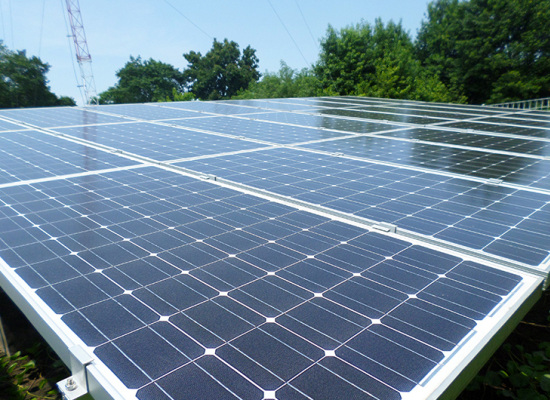
Côte d'Ivoire - Installation of Photovoltaic Generators in Abidjan
The "New Deal for Energy in Africa", launched by the African Development Bank, aims to make energy universally accessible by 2025. A progressive shift to low-carbon energy systems including renewable energies is planned in order to guarantee a green growth. The possibility of installing photovoltaic generators on the bank's site is explored within the framework of the introduction of renewable energy systems.
The Consultant's role is to perform the feasibility study for the installation of solar panels on the bank´s building and to prepare the technical methodology for the procurement of such works.
intec's services
The mission's objective for the Consultant is to evaluate the feasibility for the construction of photovoltaic generators both in technical and administrative terms:
- Site analysis (visit the identified zones and electrical installations of the bank's building, identification of the shaded areas, evaluation of technical and architectural constraints, etc.);
- Identification of administrative and regulatory constraints (possibility to obtain a building permit, cross public streets, connection of PV generators to the electricity grid, regulatory constraints, etc.);
- Sizing of high performance photovoltaic cells, adapted for the sites and setting of balances of power;
- Sizing of the bearing structures and of all the elements needed for the connection to the electricity grid or for off-grid operation of the PV generators;
- Cost estimate of all the works including the annual operating and maintenance costs for the installations;
- Elaboration of tender specifications;
- Drafting the final report of the study phase;
- Supervision of works and procurement;
- Drafting of the project's final report.
Client
African Development BankFinancing
African Development BankPeriod of implementation
15.11.2017 - 15.03.2018 -
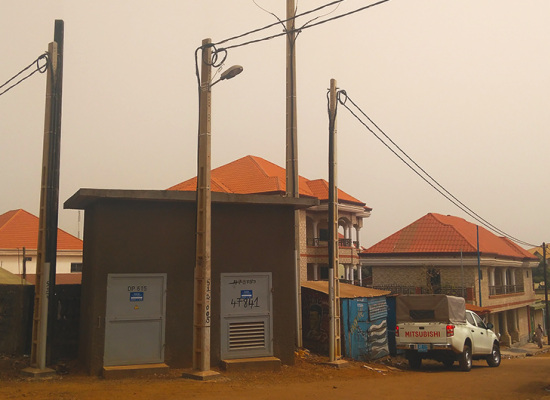
Guinea - Linsan - Fomi Transmission Line (CLSG / Rural Electrification Component Guinea)
The Linsan - Fomi transmission line project is one of the priority projects identified in the elec-trification masterplan of Guinea. The implementation of this line aims at ensuring a stable in-tegration of the national electricity networks of the ECOWAS member countries. At the same time, it serves to evacuate the power produced by the Kaleta Power Plant, the projected Souapiti HPP and other power plants to come.
The project covers the construction of approx. 394 km of 225 kV double-circuit transmission line between Linsan, Dabola, Kouroussa and Fomi with four associated 225 kV substations. It covers the following tasks:
- Line routing and production of maps, plans and profile drawings
- Environmental and Social Impact Assessment (ESIA)
- Elaboration of the Environmental and Social Management Plan (ESMP)
- Elaboration of the Resettlement Action Plan (RAP)
- Feasibility study for the line
- Preparation of functional prequalification and tender documents
- Training
intec's services
- Line routing and production of maps, plans and profile drawings
- Feasibility study, including:
- Technical interconnection study
- Economic, financial and sensitivity analyses and tariff proposal
- Risk analyses
- Training for the representatives of the projectparticipating parties on design of line interconnection and of transformer substations, and on the implementation of technical, economic and financial analyses
- Design and technical specifications for the line and the substations
- Preparation of functional prequalification and tender documents, and bid packaging
Client
Electricité de Guinée (EDG)Financing
African Development Bank (AfDB)Period of implementation
5.4.2017 - 4.2.2018 -
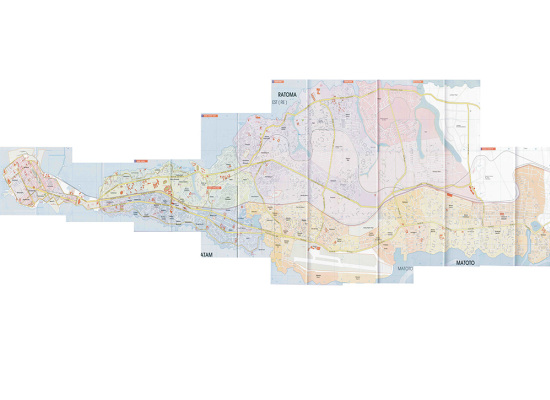
Guinea - Analysis of Electricity Supply solutions in the region of Boke
MASDAR is developing various projects in the Caribbean and other regions of the world and sourced experts to support the engineering and project management team. These support tasks are contracted separately in the form of so-called Work Orders (WO).
The Guinea Alumina Company (GAC) currently plans to extract about 15 million tons bauxite per year and to install approximately 30 MW of power capacity. The government and other key stakeholders are keen to develop power supply solutions for both the mining sector and the civil / private sector. In light of this, the present study defines the demand and potential power supply options for mining activities and for the surrounding communities.
The overall objectives of this assignment were to:
- Prepare a demand study on the power requirements for the short, medium and long term in the regions impacted by GAC´s activities.
- Develop options, incorporating both renewable energy and existing (and new) fossil fuel based generation for meeting the determined power requirements.
intec's services
- Data collation and initial analyses (initially desktop focused)
- Site visits and meetings with key stakeholders
- Tour and inspection of available facilities
- Development of project concept and options
- Feasibility report, incorporating demand study outcomes
Client
Abu Dhabi Future Energy Company - MASDARFinancing
Abu Dhabi Future Energy Company - MASDARPeriod of implementation
10/2017 - 01/2018
Côte d'Ivoire - Installation of Photovoltaic Generators in Abidjan
The "New Deal for Energy in Africa", launched by the African Development Bank, aims to make energy universally accessible by 2025. A progressive shift to low-carbon energy systems including renewable energies is planned in order to guarantee a green growth. The possibility of installing photovoltaic generators on the bank's site is explored within the framework of the introduction of renewable energy systems.
The Consultant's role is to perform the feasibility study for the installation of solar panels on the bank´s building and to prepare the technical methodology for the procurement of such works.
intec's services
The mission's objective for the Consultant is to evaluate the feasibility for the construction of photovoltaic generators both in technical and administrative terms:
- Site analysis (visit the identified zones and electrical installations of the bank's building, identification of the shaded areas, evaluation of technical and architectural constraints, etc.);
- Identification of administrative and regulatory constraints (possibility to obtain a building permit, cross public streets, connection of PV generators to the electricity grid, regulatory constraints, etc.);
- Sizing of high performance photovoltaic cells, adapted for the sites and setting of balances of power;
- Sizing of the bearing structures and of all the elements needed for the connection to the electricity grid or for off-grid operation of the PV generators;
- Cost estimate of all the works including the annual operating and maintenance costs for the installations;
- Elaboration of tender specifications;
- Drafting the final report of the study phase;
- Supervision of works and procurement;
- Drafting of the project's final report.
Client
African Development BankFinancing
African Development BankPeriod of implementation
15.11.2017 - 15.03.2018Guinea - Linsan - Fomi Transmission Line (CLSG / Rural Electrification Component Guinea)
The Linsan - Fomi transmission line project is one of the priority projects identified in the elec-trification masterplan of Guinea. The implementation of this line aims at ensuring a stable in-tegration of the national electricity networks of the ECOWAS member countries. At the same time, it serves to evacuate the power produced by the Kaleta Power Plant, the projected Souapiti HPP and other power plants to come.
The project covers the construction of approx. 394 km of 225 kV double-circuit transmission line between Linsan, Dabola, Kouroussa and Fomi with four associated 225 kV substations. It covers the following tasks:
- Line routing and production of maps, plans and profile drawings
- Environmental and Social Impact Assessment (ESIA)
- Elaboration of the Environmental and Social Management Plan (ESMP)
- Elaboration of the Resettlement Action Plan (RAP)
- Feasibility study for the line
- Preparation of functional prequalification and tender documents
- Training
intec's services
- Line routing and production of maps, plans and profile drawings
- Feasibility study, including:
- Technical interconnection study
- Economic, financial and sensitivity analyses and tariff proposal
- Risk analyses
- Training for the representatives of the projectparticipating parties on design of line interconnection and of transformer substations, and on the implementation of technical, economic and financial analyses
- Design and technical specifications for the line and the substations
- Preparation of functional prequalification and tender documents, and bid packaging
Client
Electricité de Guinée (EDG)Financing
African Development Bank (AfDB)Period of implementation
5.4.2017 - 4.2.2018Guinea - Analysis of Electricity Supply solutions in the region of Boke
MASDAR is developing various projects in the Caribbean and other regions of the world and sourced experts to support the engineering and project management team. These support tasks are contracted separately in the form of so-called Work Orders (WO).
The Guinea Alumina Company (GAC) currently plans to extract about 15 million tons bauxite per year and to install approximately 30 MW of power capacity. The government and other key stakeholders are keen to develop power supply solutions for both the mining sector and the civil / private sector. In light of this, the present study defines the demand and potential power supply options for mining activities and for the surrounding communities.
The overall objectives of this assignment were to:
- Prepare a demand study on the power requirements for the short, medium and long term in the regions impacted by GAC´s activities.
- Develop options, incorporating both renewable energy and existing (and new) fossil fuel based generation for meeting the determined power requirements.
intec's services
- Data collation and initial analyses (initially desktop focused)
- Site visits and meetings with key stakeholders
- Tour and inspection of available facilities
- Development of project concept and options
- Feasibility report, incorporating demand study outcomes






